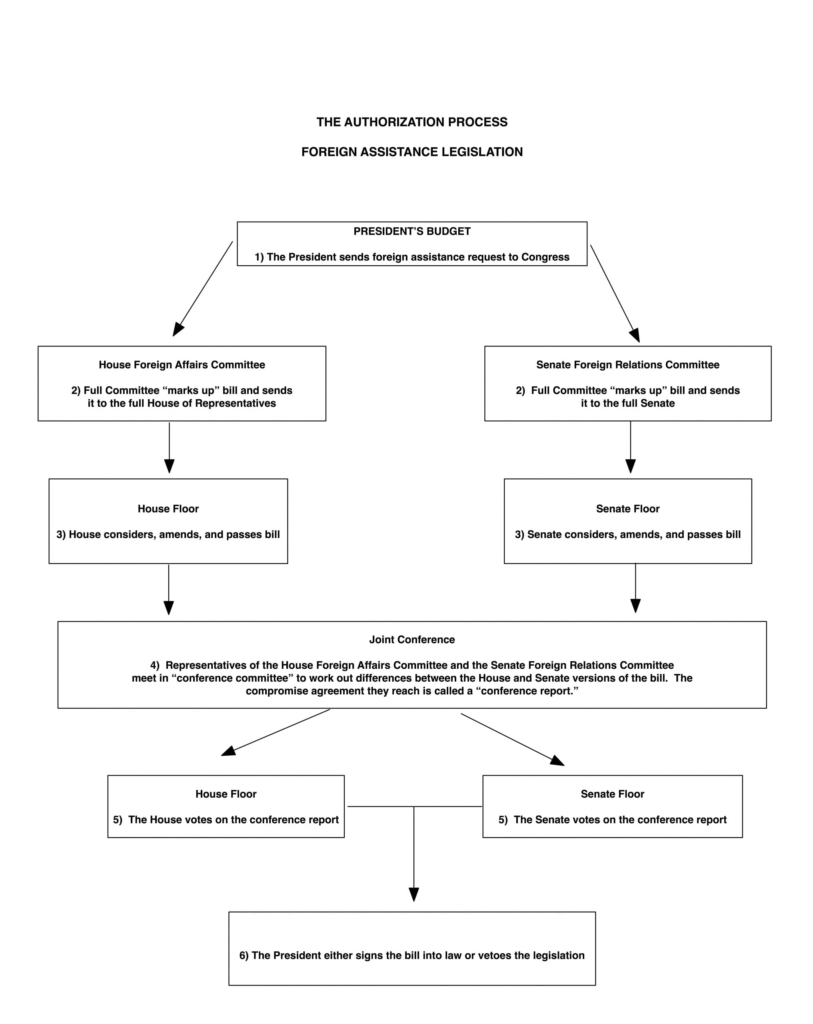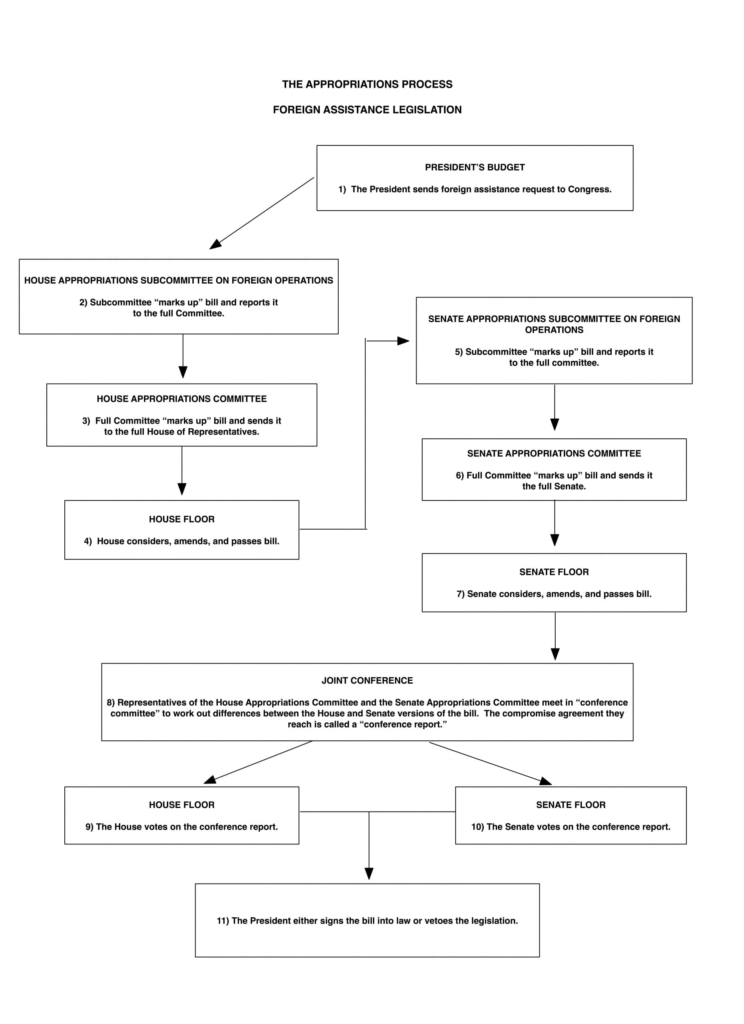
Authorization versus Appropriations Legislation
Theory: In theory, Congress should follow a two-step legislative process (authorization and appropriation) that produces two separate laws governing foreign assistance.
Foreign assistance authorization legislation – usually referred to as the Foreign Assistance Authorization bill (FAA) – is intended to be the coordinating and policy-making component of the process. Since policy is tied to funding, the authorization legislation may set “floors” and “ceilings” for funding foreign assistance programs. However, the authorization bill does not provide funding; that is the role of the Appropriations Committee.
In addition to authorizing foreign assistance programs the FAA bill normally addresses a wide range of foreign policy issues such as US interaction with specific governments and organizations. For example the FAA prohibits US assistance to a number of countries due to human rights violations or support for terrorism. Many of the provisions in the FAA have become permanent law. Although the last FAA bill enacted into law was in 1985, historically the bill was the major legislative vehicle for Congress to express its foreign policy views, insert policy language, and authorize the level of spending which appropriators were to follow
Foreign assistance appropriations, known as the State, Foreign Operations bill (as the bill also funds State Department operations) provides the funding (appropriations) for one year. Without an annual appropriation ill, there would be no foreign assistance funding even if an authorization bill were enacted. In theory, the appropriations bill should mirror the policy outlined in the authorization legislation and include little or no policy language.
Foreign assistance appropriations provide the actual money for foreign assistance programs. Appropriation bills provide money (i.e., appropriations) for one fiscal year. Without an annual appropriation bill, there would be no foreign assistance funding even if an authorization bill were enacted. The Appropriation bill is referred to as the State, Foreign Operations Appropriations bill and funds both foreign aid programs and the State Department operations. The Appropriations bill should mirror the policy outlined in the authorization legislation and should include little or no policy language, but in the absence of an authorization bill the State, Foreign Operations bill does contain policy language.
Practice: Today, the authorizing committee, House Foreign Affairs is irrelevant. Its only purpose is to pass authorizing legislation and oversight hearings. The Committee has held a number of oversight hearing on Iran and Syria, but the main purpose of these hearing by the Republican-controlled Committee is to criticize the Obama Administration’s foreign policy decisions.
The Senate Foreign Relations Committee also has been unable to pass a foreign assistance authorization bill. Unlike its House counterpart, however, it also approves treaties and State Department nominations. While the Senate Foreign Relations is also controlled by the Republicans as a result of the 2014 congressional elections, Chairman Bob Corker (R-Tennessee) has reached across the aisle to work with his Democratic colleagues, particularly on the very difficult Iran Nuclear Agreement Review Act, which recently passed the Senate. While there is criticism of the President’s foreign policy, the Senate Committee is less confrontational that the House Foreign Affairs Committee.
Congress has failed to enact Foreign Assistance Authorization for many reasons. One is the unpopularity of foreign aid in Congress – particularly in the House where the current mood is anti-foreign aid given the growing influence of Tea Party Republicans. Popularity in the Senate is also on the wane. A second factor is lack of leadership and coordination between the two authorizing committees – House Foreign Affairs and Senate Foreign Relations, although in all fairness to the two Chairmen, they did consult and coordinate on legislation opposing the Iran nuclear deal. Finally, policy disputes between Congress and the Administration, which have grown more bitter during the Obama Administration, have made passage of a foreign aid authorization bill almost impossible.
Thus, until recently it has been the House and Senate Appropriations Committees that have had the primary responsibility for funding foreign aid programs. Since the failure to pass an authorization bill since 1985, appropriations legislation has waived the requirement for separate authorizing legislation and included necessary authorization for the foreign assistance programs. Often new programs have been created and authorized in the annual State, Foreign Operations Appropriation bill.
One also could argue the appropriations process has become less relevant given the dominance of the budget process which sets the spending limits for the various budget accounts within the US Budget. The last State, Foreign Operations Appropriations bill enacted into law was in November 2005. Since then US Government programs, including foreign assistance have been funded through Continuing Resolutions or Omnibus Appropriations bills.
Continuing Resolution: A continuing resolution is passed in the absence of Congress’s failure to enact the annual appropriations bills. The Fiscal Year ends on October 1 so by September 30 2015 Congress should have enacted all 12 annual appropriations bills for FY 2016. Since Congress has again failed to enact FY 2016 Appropriations bills by September 30, a continuing resolution or (CR) currently funds the US Government at current year levels, i.e., FY 2015 until December 11, 2015 at which time the Congress will try to pass an Omnibus Appropriation bill.
Omnibus Appropriation: An Omnibus Appropriation is passed when Congress fails to enact the 12 annual appropriation bills. The Omnibus includes all twelve bills for the fiscal year. Congress is likely to pass an Omnibus Appropriation bill for FY 2016 when the current CR expires in December 2015.
Information gathered and sourced from Congressional Quarterly


